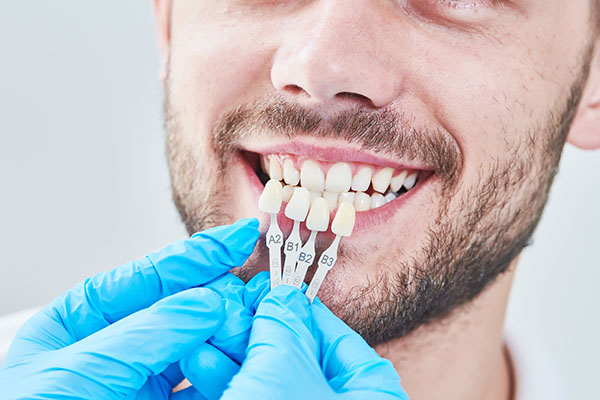 Dental veneers, ceramic or composite shells that fit over teeth to restore damage or make cosmetic corrections, are a long-lasting, durable treatment, but do eventually need to be replaced. This guide covers some of the questions patients often have about replacing this dental work.
Dental veneers, ceramic or composite shells that fit over teeth to restore damage or make cosmetic corrections, are a long-lasting, durable treatment, but do eventually need to be replaced. This guide covers some of the questions patients often have about replacing this dental work.
Dental veneer replacement
Not every set of veneers lasts the same amount of time, but the average useful life is 10 to 15 years. Once the appearance or function of the treatment has degraded, patients need to have it replaced.
Reasons veneers need to be replaced
Veneers can wear down, suffer damage or become stained or discolored over time in the same way that natural teeth do. This process may be accelerated by physical trauma to the mouth, tooth decay, poor dental hygiene, smoking or consumption of staining food and drink, such as blueberries or coffee. Additionally, the treatment sometimes needs to be removed so that the dentist can access teeth that need dental work.
The replacement process
The process of replacing veneers is very similar to the process of initially placing the treatment. The dentist begins by carefully removing the existing dental work so that the process does not damage the underlying teeth. Once it has been removed, the dentist cleans the teeth. The dentist may then remove a small amount of the tooth surface to make it easier to adhere to the new dental work.
Next, an impression is made of the tooth or teeth and sent to a lab. The lab typically takes one to two weeks to manufacture the replacement set of shells. When the lab is finished, the patient returns to the dentist to have the new treatment applied and adjusted for fit.
4 tip for maintaining dental veneers
New veneers eventually need to be replaced as well. However, there are steps the patient can take to prolong the life of the dental work.
1. Brush at least twice per day
Bacteria and plaque can build up on the veneers throughout the day. Regular brushing with a soft toothbrush and nonabrasive toothpaste removes this buildup and helps prevent tartar from forming on the dental work. It also helps maintain the health of the underlying natural teeth.
2. Do not smoke or use tobacco products
Smoking or chewing tobacco can stain both the natural teeth and the veneers. Stains not only change the appearance of the dental work but can lead to a color mismatch between the treatment and the natural teeth.
3. Floss at least once per day
Flossing helps remove food debris between the teeth that can cause decay. It is recommended to floss at least once per day, but to increase effectiveness, floss after every meal.
4. Avoid chewing on hard food or objects
Chewing on hard food or objects, such as ice, pens, or fingernails, can chip or crack the veneers. Avoid chewing on non-food objects and proceed with caution when consuming hard foods.
Conclusion
Normal wear and tear and damage caused by trauma or daily activities make it necessary to replace veneers. However, patients can take steps to prolong the life of the dental work.
Request an appointment or call Johns Creek Dentistry at 770-623-1427 for an appointment in our Johns Creek office.
Recent Posts
You can cover up imperfections in your teeth with dental veneers, thin shells of porcelain that fit over your teeth, and bond to them. Veneers can last for at least a decade, but they typically need to be replaced occasionally if a dentist must treat underlying tooth decay or gum disease. Veneers can also stain;…
If you are wanting a smile makeover, veneers are an affordable and effective option. As a restorative solution, dental veneers are custom-made shells bonded to the front of your teeth. They are made of thin composite resin or porcelain and attached with dental cement. The veneers share the same color as the natural tooth, but…
Treatments available to improve minor aesthetic issues with your teeth include dental veneers that cover up such imperfections to give your teeth a more uniform appearance. There are two separate treatments that are referred to as veneers, and while they accomplish the same purpose, they have little in common with one another otherwise.Knowing the difference…


